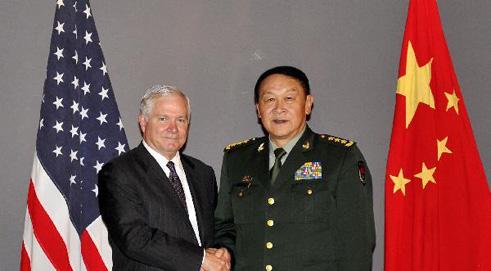
Chinese Defense Minister Liang Guanglie (R) shakes hands with U.S. Defense Secretary Robert Gates while meeting the press together in Hanoi, capital of Vietnam, Oct. 11, 2010, on the sidelines of the 1st ASEAN Defense Ministers' Meeting Plus (ADMM-Plus). (Xinhua/Huang Xiaoyong)
HANOI, Oct. 11 (Xinhua) -- U.S. Defense Secretary Robert Gates on Monday accepted an invitation to visit China early next year, a Chinese official said.
Chinese Defense Minister Liang Guanglie extended the invitation during his talks here with Gates, Guan Youfei, a Chinese Defense Ministry official, told a press conference.
Although very brief, the meeting showed that both sides attach great importance to developing military ties between the two countries, and was helpful to enhance mutual understanding and trust, he said.
The tete-a-tete between the two defense chiefs was their first since bilateral military ties soured in January following Pentagon's decision to sell a 6.4-billion-dollar arms package to China's Taiwan province.
While noting the setback, Guan said that ties between the two militaries have never ceased moving forward, and dialogues and exchanges under some established frameworks will continue.
Beijing and Washington will hold their annual consultations on maritime security in Hawaii later this week, which will be followed by a new round of annual defense consultations in Washington, he added.
The schedule has not been fixed for the Washington meeting, which is to be co-hosted by Deputy Chief of the General Staff of the Chinese People's Liberation Army Ma Xiaotian and U.S. Under-Secretary of Defense Michele Flournoy, Guan said.
Commenting on the on-again-off-again military ties between China and the United States, Guan stressed that the main obstacle is Washington's arms sales to Taiwan.
During talks with Gates, the Chinese defense minister said it is important for the two countries to respect each other's core interests and major concerns, consolidate mutual trust and decrease suspicion and misjudgment, and properly settle differences and sensitive issues in order to keep bilateral military ties in a healthy track.
Source: Chinaview
Related News
Photos
More>>trade
market
- China, South Africa Seek Stronger Legislative Ties
- China, Africa Celebrate 10th Anniversary of Cooperation Forum
- Senior Chinese Military Officers, DPRK Leaders Watch Performance to Mark
- Senior CPC Leader Inspects Southeast Province, Urges Increased Development
- Chinese Political Advisors Make Suggestions on 12th Five-year Plan
finance
- Chinese Vice President Stresses Importance of Cadres from Ethnic Minorities
- China, US Pledge Cooperation in Law Enforcement
- 7th China-ASEAN Expo Opens to Provide New Opportunities, Witness Fruits of CAFTA
- Chinese Premier Seeks Advice from Political Advisors on 12th Five-year Plan
- China to Enhance Coordination with IMF: Premier Wen





